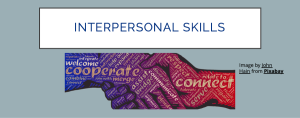Interpersonal skills

Effective communication enables trainers to deliver information and knowledge to the learners. It involves explaining concepts, presenting ideas, and providing instructions clearly and understandably. Without effective communication, learners may struggle to grasp the content being taught. Everyone has unique learning needs, and effective communication allows trainers to understand their students’ strengths, weaknesses, and learning styles. By actively listening to future peer visitors and engaging in meaningful conversations, trainers can tailor their instructional methods, adapt their teaching strategies, and provide the necessary support to help learners succeed.
Take a few moments to watch the following video highlighting the importance of effective communication (6min).
Intentional and unintentional communication
An example of intentional communication, is verbal communication: i.e. What would you like to do today? An unintentional communication could be a person rolling their eyes, or shrugging their shoulders in response to the question, while directly saying, something else.
Understanding and listening
One obstacle to communication is understanding and listening. As a trainer, you will want to clarify with the participants, that they have understood the material. As a trainer, you want to be intentional in your communication. Be clear when sharing information, and asking for feedback, to ensure the participants are receiving the message, you intended, in your communication. Check in with the participants, to see if they understand the material, by paraphrasing, summarizing, and asking questions of the participants. Also, checking the non-verbal communication being shared by the participants. I.e., Have they disengaged? Are they no longer responding to your questions? If so, take a moment, to re-engage. Maybe a break is needed, maybe the information has been too intense, and need to take a step back and ask the participants what they need.
Communication skills, used by the trainer during the session, could include paraphrasing, summarizing, questions, and verbal and non-verbal communication. Additionally, guiding a conversation enhances communication effectiveness, promotes active participation, facilitates learning and problem-solving, and helps achieve desired outcomes. It is a valuable skill that can lead to productive and meaningful discussions in various settings.
Time and classroom management
Lastly, an important topic to discuss with future peer visitor trainers is time and classroom management. What do you do in a situation where someone asks questions all the time, to the point where things get off schedule? Given that we are an organization focusing on people who have experienced amputations, it is natural that when people meet, they will want to talk about their own experiences and associated traumas. Having the ability to methodically guide a conversation to stay on track while being respectful of each learner is essential.
Slides #23-28
